A Brief History Of Contested American Presidential Elections
To contest the outcome of an election is when one political candidate, a political party, or the public disagrees with the declared winner.
The last four years in the United States have been one for the ages. The political drama, shootings of unarmed people, protests countrywide, and to top it all off, a pandemic that has killed hundreds of thousands of Americans.
In all of the chaos, there was a presidential election. The race between incumbent Donald Trump (Republican) and Joe Biden (Democrat) made history. Biden's defeat of Trump has made for some firsts this country has ever had.
His Vice President is Kamala Harris shattered glass ceilings; becoming the first woman as well as the first African-American and Southeast Asian roots. Biden is the oldest to win the election at age 78. The Biden camp has also announced the first all-female communications team to help run the White House.
But in all of the workings of transitions, there are some who still do not accept the results of the 2020 election. These people consist of not just Trump supporters in the general public but also elected officials. Senators like Ted Cruz, and Marsha Blackburn, and members of the House including, Jim Jordan, and Matt Gaetz.
However, this is not the first time an election was contested. In fact, there are eight other times where American elections were disputed. Check out how those eight helped shaped American politics.
1. Election of 1800
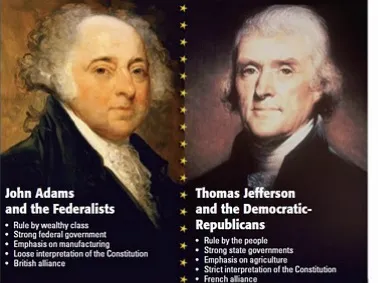
The election of 1800 was only the fourth election for the still-new United States. Only twelve years have passed between George Washington and the declared winner Thomas Jefferson. This election was significant for the formation of factions; or what we call political parties today. On one side you had the Federalists, who consisted of founders like George Washington, John Adams, and Alexander Hamilton. On the other side were the Democratic-Republicans who had founders like Thomas Jefferson, James Madison, and James Monroe.
Prior to 1804, the constitution stated that the candidate with the most votes would become President while the candidate who placed second in votes became Vice President. Because of this, the political affiliations of the President and Vice President are different. If there is a tie, then the election is moved to the House of Representatives. In 1800, that is exactly what happened.
Thomas Jefferson tied with Aaron Burr 73-73. The House is responsible for breaking the tie and did so by casting support for Jefferson. As a result, the Vice President became Aaron Burr. Depending on who is to be believed, the tie-breaker was influenced by former Treasury Secretary and Federalist Alexander Hamilton. Burr would go on to hold Hamilton responsible for his loss and would kill Hamilton in a duel in 1804.
Nevertheless, there clearly was a problem with how the Vice President is chosen in an election. The result was the 12th Amendment to the Constitution, which establishes the criteria to be president. It also added that the two offices would have separate votes instead of first place and second place winners.
2. Election of 1824
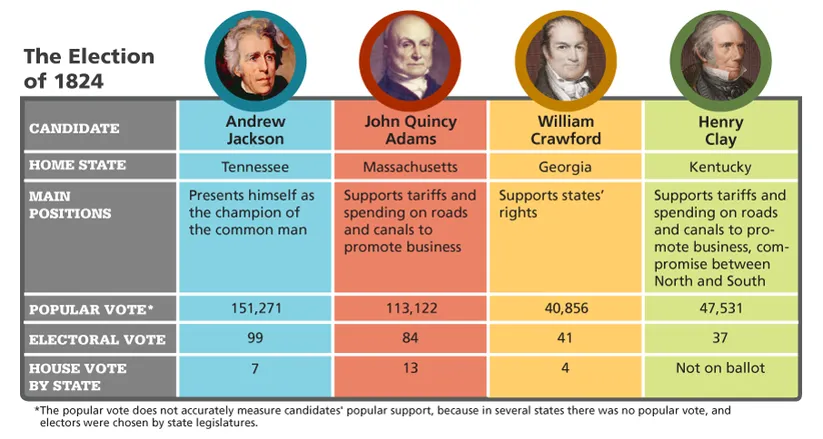
Only 24 years later, the election of 1824 had some of the same elements from 1800 but a bit more complicated. Rather than a tie, the votes were split between four candidates. Andrew Jackson had received a total of 99 votes, while John Quincy Adams received 84 votes. The other two candidates William Crawford (a former Treasury Secretary) took 41 votes and the Speaker of the House Henry Clay took the remaining 37 votes.
This meant that no one candidate held the majority of votes. So, as in 1800, the election was sent to the House of Representatives. Because the constitution states that only a total of three candidates could be considered, House Speaker Henry Clay was eliminated as he placed fourth. However, because Clay was the Speaker he had more control over the swaying of votes.
A month passes before a winner is declared. In the end, Speaker Clay convinced his supporters to support John Quincy Adams. With Adams now in the lead, the remaining states (some of whom were Jackson supporters) opted to move their support to Adams as well. This gave Adams the majority of the votes and he was declared the winner of the presidency.
Andrew Jackson objected to the results; and is said to have believed a 'corrupt bargain' was made after Adams gave Clay the Secretary of State position. Jackson made clear that he would return in the election of 1828 and challenge Adams again. He will go on to beat Adams that year becoming president relegating Adams to (like his father) one term.
3. Election of 1860
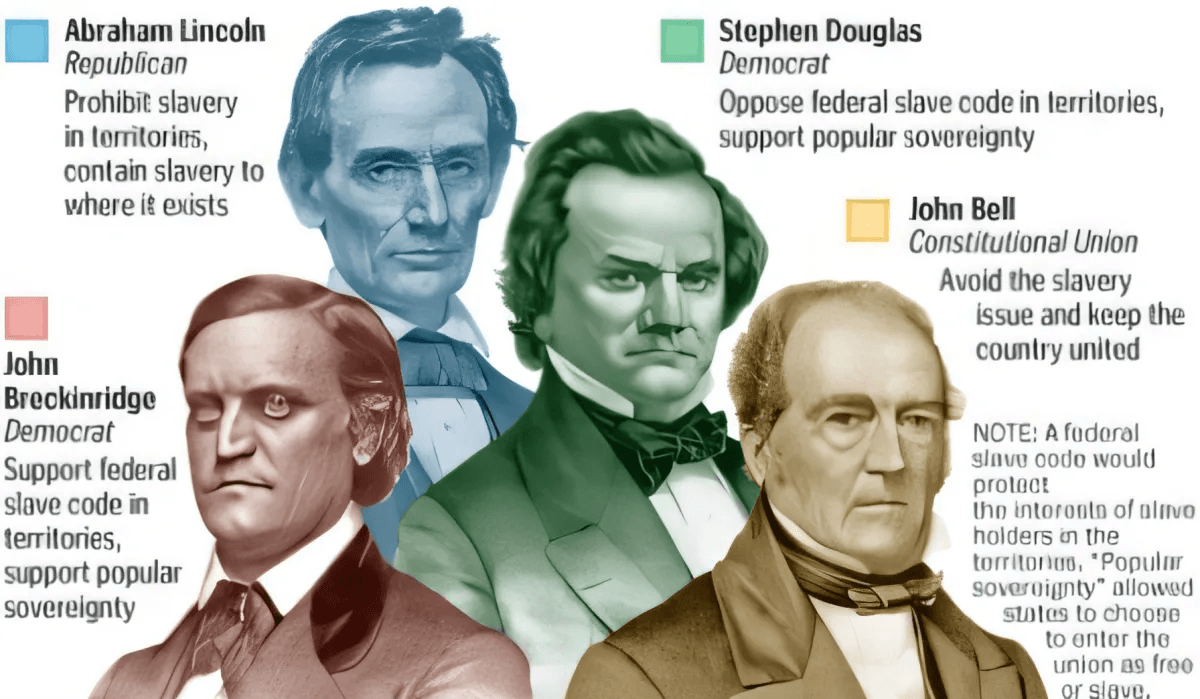
An argument could be made that the election of 1860 and 2020 have more similarities than some would like to admit. This is the election that becomes a catalyst for the southern states to withdraw from the union resulting in the Civil War.
The previous two elections were a sort of pacifier agreement between the northern and the southern states. The Missouri Compromise allowed a balance between slave states and free states. For every slave state admitted to the union, a free state would also be added.
This is also the first Presidential election with a Republican candidate; Abraham Lincoln. Republicans were a spin-off from the now-defunct Whig party. Mostly northerners in support, republicans were against slavery. Lincoln's candidacy became a concern of the southern states who feared they would lose their property.'
The Democratic Party had split in the support of candidates. On one end there was support behind Stephen Douglas; who had no official stance on slavery. The other side of the Democrats put their support with John C. Breckenridge; a senator from Kentucky who believed in state succession.
Unlike 1800 and 1824, Lincoln won the majority of the votes. Those votes mostly consisted of the northern states plus the newer states on the west coast California and Oregon. Knowing that Lincoln was against slavery, there was a belief that his win would begin the deconstruction of slavery in the United States.
Within weeks of the election, South Carolina became the first state to leave the union in December of 1860. Ten more states will follow, with the official start of the Civil War at Fort Sumter, South Carolina in 1861.
This year's election while seen as a constitutional crisis in the dispute over a winner, unlike 1860 all the states certified and confirmed electoral votes for Joe Biden. So the dispute lies within Congress and not at the state level.
4. Election of 1876
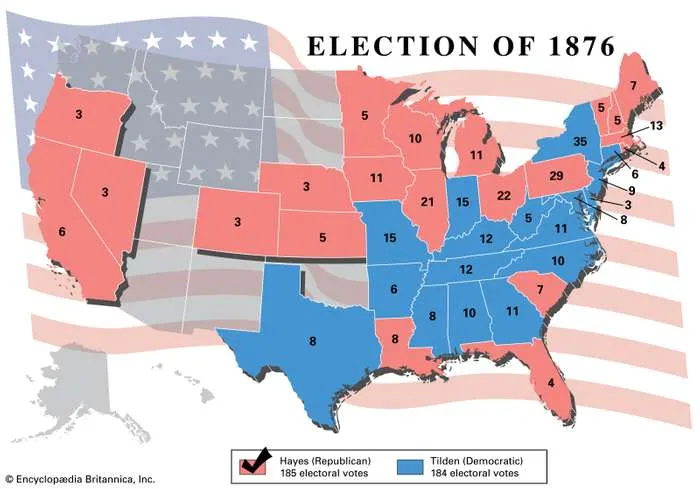
When historians talk about contested elections in American history, generally the election of 1876 is one of the first-mentioned. In its description of the election, the History Channel describes it as a "doozy." This election has significance because its result determined the future of Reconstruction in the South. It also is the first real election where one candidate won the popular vote, but not the electoral vote.
On the Republican side was Ruthford B. Hayes and for the Democrats Samuel J. Tilden. On paper, this seemed pretty straightforward. Tilden won the popular vote by a huge margin. But when it came to the electoral college, the electoral votes in the states that won did not equal a number that surpassed Hayes.
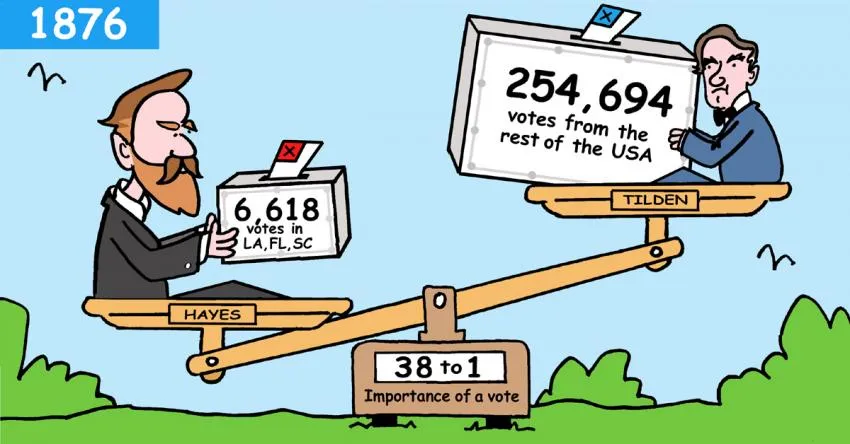
The electoral votes in the House of Representatives are based on the population of the states. The more populous the more electoral votes. This is why some states like California have a total of 55 electoral votes and New Hampshire has a total of 4. As the populations shift in each state, the numbers can be taken or added to states based on the fluctuation of the population.
Tilden looked like a lock for winning the White House. But Hayes, while losing the popular vote had 19 electoral votes more than Tilden even though Tilden was just one vote short of the number needed to be considered the majority.
In the end, Congress decided to form an investigation to look into all of the issues that aroused during election day and determine who the last 20 outstanding Electoral votes were to be given to. It would end in the swaying of support going in the direction of Hayes; though democrats from the south objected to this. Eventually, a deal is struck; where Hayes would agree to remove Federal troops from the South if they, in turn, gave the position to Hayes.
The unintended consequence would be so that the South; still recovering from the civil war had more power, could push out the stationed union troops. Their overall control of the South was back in control; resulting in decades of political, social, abuse of the African American country.
5. The election of 1888
According to Smithsonian Magazine, the election of 1888 was also filled with controversy. President Grover Cleveland was running for re-election against the Governor of Indiana Benjamin Harrison. Harrison, the grandson of the ninth President William Henry Harrison: would go on to win the election. Ousting Cleveland in an election filled with bribery and deceit.
At the time votes for candidates were being offered to the highest bidder, essentially 'fixing' races. Because the use of paper ballots was being distributed by the political party and not by state governments, there was an opportunity for bribery.
The Republican treasurer William Dudely had sent over letters to local republicans in Indiana telling them how to separate voters who were willing to take bribes to ensure a vote for republicans.
The letters were leaked to the Democrats, who released copies to the press. On the day of the election, Harrison would win the state of Indiana; however, it seems apparent that he would have won overall even without the state.
President Cleveland, like in the election of 1876 would win the popular vote like Samuel J. Tilden but lost the state of New York. This loss would put Harrison over the top in the Electoral College. While it was rumored that there were bribes happening in New York as well, Cleveland opted not to challenge the election results.
Upon leaving the White House, the outgoing First Lady mentioned to staff "Don't worry, we'll be back." Cleveland would go on to run for President again in 1892 and defeat Harrison. He would be the only President to serve in two non-consecutive terms.
One caveat in terms of the electoral process in the United States was the eventual adoption of ballots becoming more secretive, and dispursed by states.
6. Election of 1912
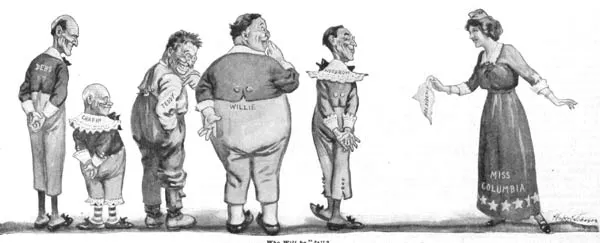
The election of 1912 was an example of what can happen when one party has two prominent leaders and the damage it can do. On the Democratic side is Woodrow Wilson; a former head of Princeton University and a former Governor of New Jersey.
But on the Republican side, things were shaping to be difficult in where allegiances lied between former President Theodore Roosevelt and the current President William H. Taft. Taft was Roosevelt's hand-picked successor when he left the White House in 1908.
But Taft became a disappointment in Roosevelt's eyes. The conservativism that became more prominent in the party became increasingly support of Taft. More of a progressive, the former president felt that parts of the republican ideals were being left behind.
As the primary elections drew nearer, Roosevelt decided to challenge Taft for the presidency. After months, Taft would go on to keep the Republican nomination. This was no deterrent for Roosevelt; who in response created his own party and continued the quest for the presidency.
Now, this is a three-man race. When Election Day came, the Republicans were split. Some for Taft, others for Roosevelt. Because they split the vote, Woodrow Wilson and the Democrats were able to gain the majority in the electoral college.
Wilson would go on to serve two full terms as president; serving as commander in chief through the First World War. As for his opponents, both men would go on two different paths. Taft, who never actually wanted to be president; aspired to be a Supreme Court Judge. He would go on to realize that dream by serving as the Chief Justice of the Supreme Court during the 1920s.
Roosevelt a lifelong active man began to grow slower with age. An avid hunter and adventurist, Roosevelt spent time exploring the world. He became weaker as his body began fighting against diseases and ailments he suffered while on those adventures. He would later pass away before the decade was out.
7. Election of 1948
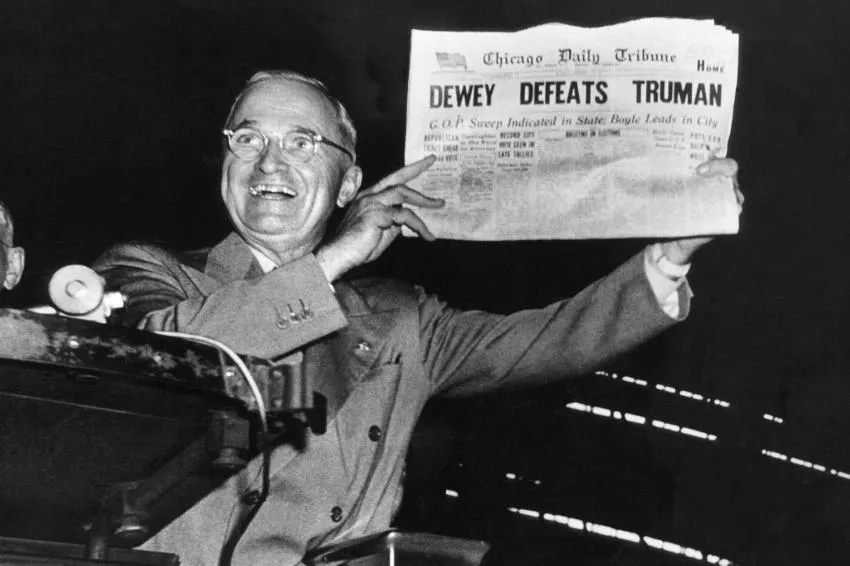
The photograph is almost iconic. The image of Harry Truman holding the front page of the Chicago Daily Tribune with the headline: DEWEY DEFEATS TRUMAN is one of the most famous pictures in election history. So how did the Chicago Daily Tribune get it wrong?
Truman had some of the worst approval ratings of any sitting president going into the election. His Democratic party was on the outs, and the previous midterm election in 1946 resulted in a flip in the control of Congress into Republican hands.
While he had taken over as President upon the death of Franklin D. Roosevelt, by the time 1948 came, most Americans were no fans of the Missouri-born salesman. His challenger, Thomas Dewey was the same nominee from FDR's 1944 re-election for the Republicans. The Republicans felt that Truman's unpopularity could allow them a chance at gaining control of the White House.
Truman also had issues within his own party. He was a strong supporter of Civil Rights at a time where a lot of southern Democrats took offense. Even a member of his own cabinet resigned; deciding to run against him under another ticket.
Taking his campaigning on the road, Truman made visits across the nation making his argument against Dewey and the plans Republicans had in store for the country. Using the legacy and the reforms from his predecessor put in place to help the U.S. out of the Great Depression; Truman hoped that Americans would see that those reforms would remain in place with his re-election.
Going into Election day, the polls all had Truman down to Dewey. The margins to these polls gave the impression that even with a decent turnout, the likelihood of Truman conquering it was slim. Deciding not to stay up late to watch the returns, Truman went to bed that evening. He assumed he was going to lose, so there was no point in watching.
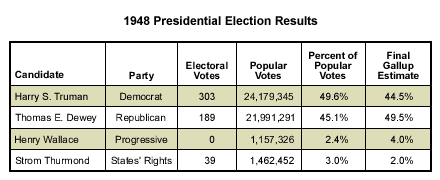
But early the next morning Truman is wakened with a stir. A Secret Service agent had entered his bedroom to alert him that he had actually won. Turns out that the company behind the poll (Gallup) had actually used a poll that had been taken weeks prior to election day. The result was false data that the press used to predict the winner. When Truman is holding the now-famous paper, he has a grin ear to ear showing his excitement over the win.
8. Election of 2000

Hanging chads. The two words that became synonymous with the 2000 election. The outgoing President was Bill Clinton, who had served his two terms 1992-2000. With him unable to run, the Democrats nominated his Vice President Al Gore.
The Republicans had two major contenders to take on Gore in the fall. The first being war veteran and hero John McCain and the other the son of Clinton's predecessor George W. Bush. At the end of the primary season, it was clear that Bush would be the nominee.
When Election Day came, no one thought it would be any different than any other. It had been over 50 years since an election had any hang-ups or controversies.
But when the polls closed that November day; it became apparent that this was an election that could have gone on for years. It all came down to one state. Florida.
Florida's election counting showed that Gore had a small lead in the state. Some media outlets decided to call the race for Al Gore. But in others, it was too close to call. The night would go on with the understanding that Florida may be in need of a recount.
The recount of the Florida votes was eventually challenged in court prompting an investigation into the ballots themselves. What actually counted as a vote for either candidate became confusing; as to how to interpret the ballot's choice for president. Some of the ballots had these hanging chads still attached to the ballot after a voter turned it in.
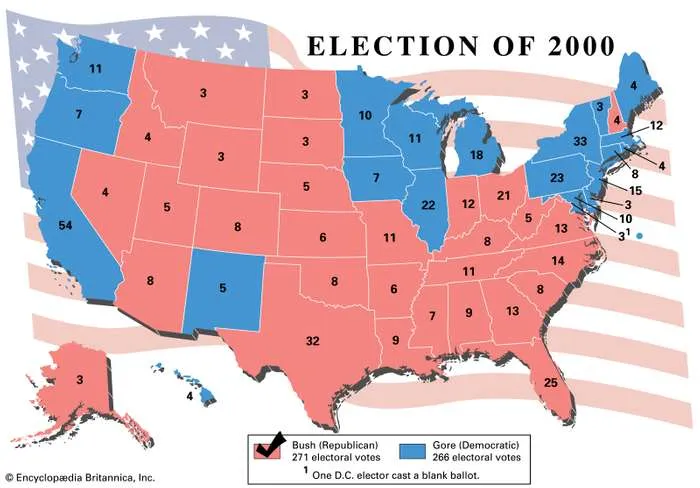
In the end, the litigation from both sides over the counting of these chads and the discussion on voter fraud brought the election to the Supreme Court. The court made the decision to order the recount in Florida stopped. Their reasoning was in their opinion the votes were not being treated as fairly as say other ballots in other states.
Without a recount, the Gore campaign lost the chance to further contest the election. His defeat meant that for the first time in over 100 years did a nominee won the Presidency without having the popular vote. Bush would also have his own historical first; he became the first son since John Quincy Adams to serve as President after his own father was President.
9. Election of 2016
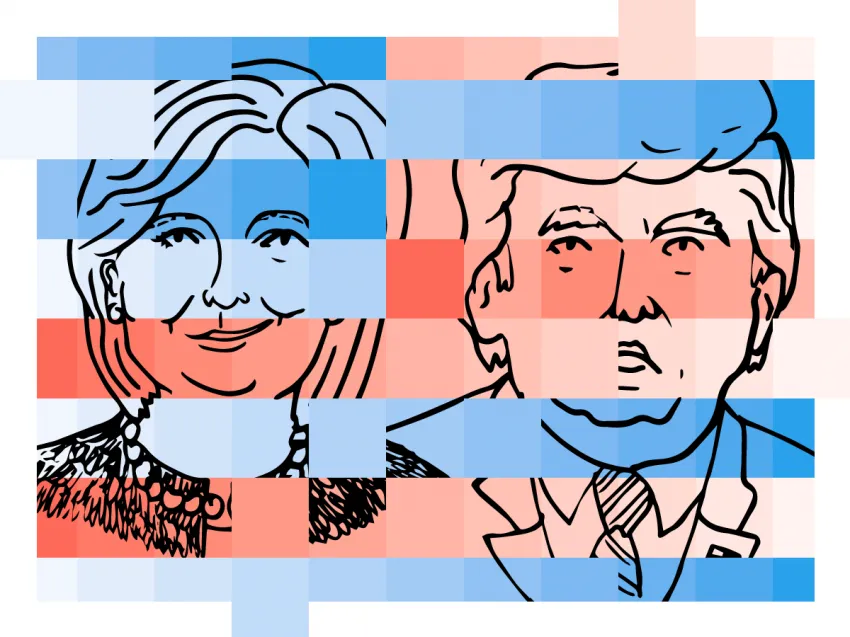
The election still in the rearview mirror, the election of 2016 was one full of rhetoric, controversial nominees, and left a lot of Americans scratching their heads. Barack Obama's eight years are up, and both Democrats and Republican parties all had an equal chance to win the position.
The Republican party was filled with different kinds of leaders, with different ways of interpreting the ever-changing aspect of American life. The Democrats, on the other hand, all assumed that the nominee would be former Secretary of State and the wife of former President Clinton, Hilary.
But there was at least one candidate who did not think that Clinton could win against the Republicans in 2016, and that was Bernie Sanders. Clinton had some concerning issues about what happened during her time as Secretary of State. The memories of the attack in Benghazi still haunted her, and the Republicans used this in their attacks against her.
It seemed all kinds of Republicans were running for President. Nominees who ran for President included: Senators Ted Cruz, Marco Rubio, Rand Paul, former Governors John Kasich, Mike Huckabee, Jeb Bush, as well Dr. Ben Carson and former Hewlett-Packard CEO Carly Fiorina, and reality star and billionaire Donald Trump.
Donald Trump's candidacy was one that started with a good amount of discriminatory inflections and speeches that spoke to the more extreme about the browning of America. His words and willingness to attack his opponents only strengthened his supporters into thinking that only he can stop the liberals that had made Obama so successful.
While Clinton was the assumed Democratic presumptive nominee in all but name, the independent senator from Vermont Bernie Sanders decided to also run for president under the Democratic ticket. His involvement sparked a huge movement of young progressive voters wanting a radical change of the establishment. Issues such as Black Lives Matter, Student Debt Relief, and equal pay were all issues that attracted voters to Bernie Sanders.
The election of 2016's controversies had more to do with the behavior and reputation of the candidates, than the actual election process. For Clinton, Trump capitalized on the hacking of her emails, the investigation that the FBI Director James Comey began in the midst of the election, and exploiting her words when she referred to his supporters as 'deplorable.'
For Trump, it was one thing after another. The insulting of different cultures; referring to Mexican immigrants as 'rapists, and thugs.' His relationship and alleged pay off of former lover Stormi Daniels; and the biggest scandal of all the Access Hollywood tape. The tape was of Trump and former host Billy Bush talking inappropriately on a hot mic about women. Trump is heard saying derogatory things about women, insinuating that 'grabbing' them controls them.
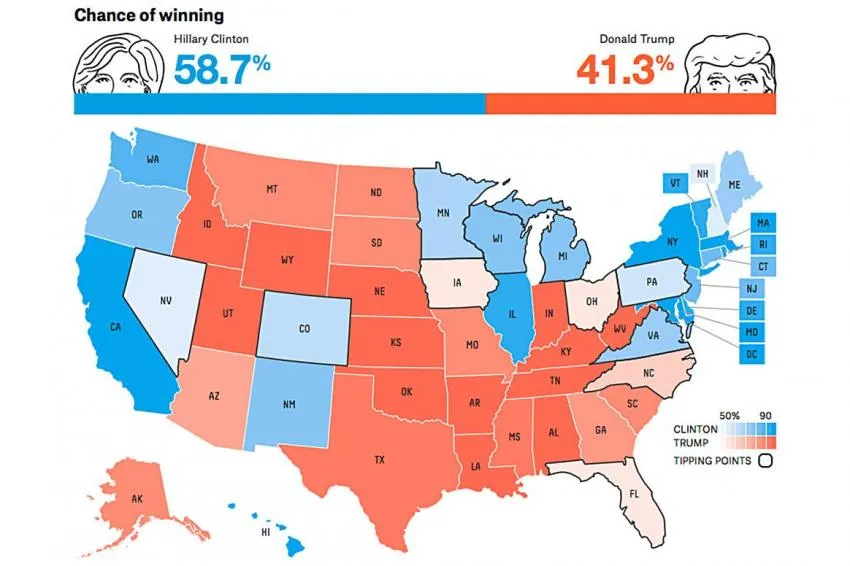
As the election drew closer, the polls in all the media outlets showed Clinton in the lead and were the expected one to win on Election Night. But in a complete shock to the nation and even their campaign, Trump defeated Clinton. In a reminiscence of 1876, Trump had won the Presidency without the popular vote.
In the years following 2016, many pollsters and analysts have looked back on the election to see how they got it so wrong. Trump's time in office through the present has been one filled with controversy, lack of empathy, irresponsibility, and at times chaotic. All of these became the catalyst for the importance of the 2020 election.
Bonus: 2020 Election
Thanks to 2016, the 2020 election is considered to be one of the most secured elections in the history of the United States. The Democratic field of candidates included well over ten people. There were some firsts among them; including the youngest and first openly gay candidate in Pete Buttigieg, the first African American woman in Kamala Harris, who also is the first candidate of South Asian heritage.
The assumed front runner during the 2020 election cycle had always been Joe Biden. Though in the early primary days it looked as if Biden was not going to make it past the primaries until he won South Carolina. From there it became a snowball effect, with Biden winning the nomination.
On top of the election, the United States became a huge hot spot for the newly discovered Coronavirus Covid-19. It has killed well over 300 thousand people to date, yet during the election cycle, Trump did little to nothing to help the American people. More and more Trump kept stressing that it wasn't a big deal, and dragged his feet to effectively manage what has become a massive ordeal.
Biden would go on to defeat Trump in November 2020. Trump for the entire election cycle argued that there was rampant fraud throughout the country. He would refuse to concede; going so far as to pressure the Secretary of State in Georgia to 'find' the votes he needed to overtake Biden.
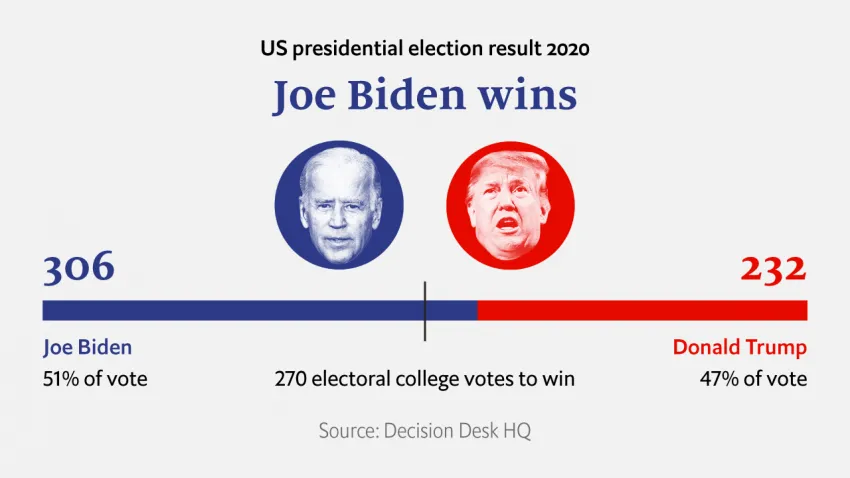
Now with just days until the inauguration of Joe Biden, the U.S. Capital is on edge after Trump enticed his own supporters to overrun the building. The calls for the 25th amendment or impeachment have become bipartisan. Trump's supporters are either resigning, turning, or stubbornly staying loyal.
This is history at work in real-time. Its results are yet to be determined, but will certainly find themselves inside the books about American history.
Opinions and Perspectives
The peaceful resolution of most of these disputes is pretty remarkable when you think about it.
Fascinating how each crisis led to specific reforms to prevent similar issues in the future.
The influence of House Speaker Clay in 1824 really shows how one person could sway an entire election back then.
It's remarkable how many of our electoral procedures came from fixing problems in these contested elections.
Reading this makes me appreciate the improvements we've made in election security and transparency.
The media's role in shaping public perception of election results hasn't changed much.
These historical examples really show why having clear election laws is so important.
Never realized how many presidents won without the popular vote throughout history.
The importance of Congress as a backup plan for resolving election disputes is really evident here.
Interesting to see how vote counting and verification methods have evolved since these earlier elections.
The article really drives home how our election system has been continuously refined over time.
Found it fascinating how many of these disputes centered on specific states' electoral votes.
The way Hamilton influenced the 1800 election outcome is particularly interesting.
These stories make me appreciate the importance of having strong democratic institutions.
The transition from party-distributed ballots to government-issued ones was a huge improvement.
Imagine if social media had existed during any of these historical contested elections!
I'm struck by how many of these disputes arose from close Electoral College margins.
It's fascinating how each of these crises led to specific reforms in our electoral system.
These accounts really highlight the importance of having clear succession rules.
Anyone else surprised by how many times the House of Representatives had to get involved?
Looking at these examples, it's clear we need better standardized election procedures across states.
The impact of the 1876 compromise on civil rights was devastating. Really changed the course of history.
Funny how polling errors have been a thing since Dewey vs Truman. You'd think we'd have figured it out by now!
History really does repeat itself in some ways. These patterns keep showing up.
Each of these contested elections seems to have exposed different vulnerabilities in our system.
The evolution of our voting system through these crises is actually pretty impressive.
Never knew about the 1824 'corrupt bargain.' Politics hasn't changed much, has it?
The article shows how resilient our democratic system is, even when severely tested.
I find it ironic that some of our biggest democratic reforms came from these contested elections.
These stories really highlight how crucial it is to have clear rules for resolving electoral disputes.
Reading this makes me appreciate the reforms we've made to make elections more secure and transparent.
The Truman comeback story is still one of the greatest political upsets in history.
Can't believe how blatant the vote buying was in 1888. At least we've made progress on that front!
The role of Congress in resolving these disputes is fascinating. They've had to step in quite a few times.
I think it's important to note that most of these contentious elections still resulted in peaceful transfers of power.
The way the 1860 election split the Democratic Party reminds me of modern political divisions.
I'm struck by how many of these disputes ended up in Congress or the Supreme Court rather than being resolved by the voters.
The article really shows how our election system has been tested throughout history.
Interesting how technology has changed things. Now we expect results on election night, back then it could take weeks.
The detail about Cleveland's wife saying 'we'll be back' is such a great historical tidbit.
I never realized how many of our electoral procedures came from fixing problems in these contested elections.
Reading about these makes me wonder what future historians will write about recent elections.
The whole Aaron Burr situation really puts modern political rivalries in perspective!
Found it interesting how the 1888 election led to reforms in ballot secrecy. Shows how each crisis led to improvements.
That's what makes our democracy work though. The ability to resolve these disputes through established channels.
It's remarkable how peaceful most of these transitions of power were, even when hotly contested.
The article makes a good point about how each contested election led to some kind of reform. Maybe that's the silver lining?
I think we're still dealing with the consequences of the Hayes-Tilden compromise of 1876. That decision had such long-lasting effects.
The media's role in these contested elections is fascinating. From the Chicago Tribune's mistake in 1948 to modern polling errors.
And then Clay became Secretary of State under Adams. Pretty sketchy if you ask me.
Looking at 1824, it's wild how much influence House Speaker Clay had in choosing the president.
That early system sounds like a recipe for disaster. Imagine having a president and VP from opposing parties today!
I can help with that! Before the 12th, the runner-up became VP. After, candidates specifically ran for VP position.
The article didn't go into detail about how the 12th Amendment actually changed things. Would love to learn more about that.
Can't help but think about how different history might have been if some of these elections had gone the other way.
The 1912 election really shows what happens when you don't have unity within a party. Roosevelt split the Republican vote and handed it to Wilson.
I respectfully disagree. The electoral college still protects smaller states from being completely overshadowed by population centers.
The whole concept of the electoral college made more sense when communication between states took weeks. I think it's outdated now.
Interesting that you should mention that. I looked it up and it's happened 5 times in our history.
Anyone else notice how many of these contested elections involved the popular vote winner losing? Seems like a recurring issue.
What I found most interesting was Cleveland's comeback. Only president to serve non-consecutive terms - talk about persistence!
The corruption in the 1888 election is wild. Imagine openly buying votes like that today!
You raise a good point. I've read that armed groups were actually preparing to march on Washington if Hayes hadn't been declared winner.
The article didn't mention how close we came to civil war in 1876. The Hayes-Tilden compromise was basically made under threat of violence.
I'm still amazed at how Aaron Burr actually killed Hamilton over political rivalry. Politics was literally deadly back then.
That famous photo of Truman with the newspaper headline gets me every time. Reminds us not to trust polls too much!
The election of 1912 really shows why we need ranked choice voting. A split party basically handed the presidency to Wilson.
Actually that's not quite right - it happened again with Trump in 2016. Makes you wonder if we should reform the electoral college.
True, but what's even more interesting about 2000 is that it was the first time in over 100 years someone won without the popular vote.
I never knew about the hanging chads issue in 2000 until I read this. It's amazing how something so small could have such huge consequences.
The parallels between 1860 and 2020 are quite sobering when you think about it. Both times saw such deep division in the country.
Reading about the 1876 election makes me angry. That compromise essentially ended Reconstruction and set civil rights back by decades.
What strikes me most about all these contested elections is how each one seems to reveal weak points in our electoral system that need fixing.
I find it fascinating how the election of 1800 led to such significant constitutional change with the 12th Amendment. Really shows how our system has evolved through trial and error.
